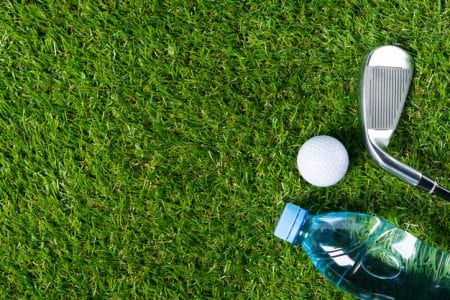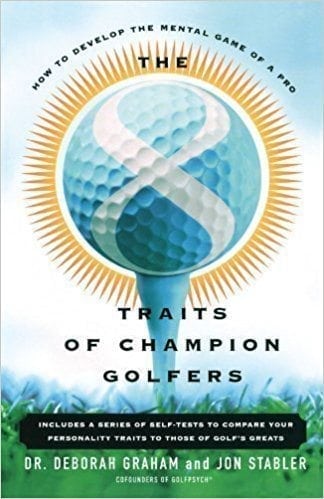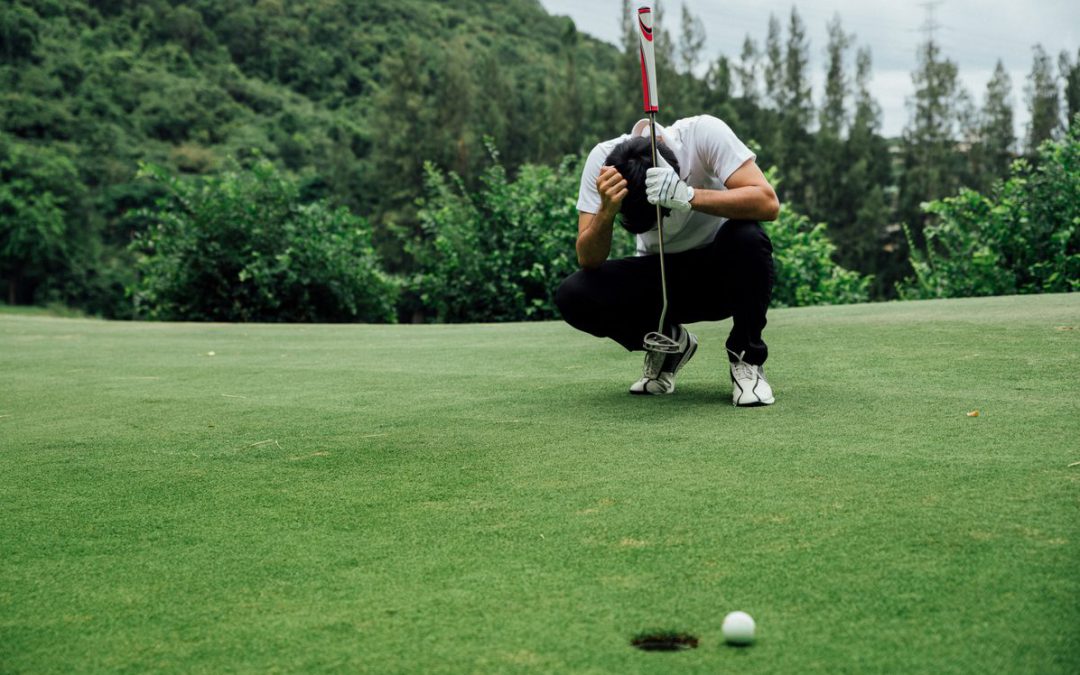We have determined through personality studies and our work with many Tour players that there is an appropriate level of tension for optimum golf performance. On a 1-10 scale where one is very relaxed and ten is very tense, optimum performance occurs when you manage your tension between 4 and 6.
To best manage your tension, we encourage you to explore various methods for reducing tension and stress until you find those best suited to you. We have summarized some of the most effective techniques for managing your tension and grouped them into two major areas: physical and mental. This article will cover physical methods. The next article will cover mental techniques.
With the inseparable mind-body connection, the physical and mental areas obviously overlap. It is our experience that with some combination of the two approaches, you will become most effective at managing your tension for peak performance.
Body Checks: Identifying Tension
Several times during the round or day scan your body for tension. Check locations where you feel your tension the most, such as shoulders, neck, abdomen, jaw, face, back, etc. You probably notice unusual tightness in these muscles. You may have related pain or stiffness, such as headaches, neck aches, backaches, jaw pain or digestive problems in these areas. You can also scan for physical signs of golf stress such as drawn shoulders, clinched fists, tight face, furrowed brow, and the stretching of the neck or lower back forward.
On the Course: good times to scan your body for tension are on the first tee, as you approach particularly difficult shots, around the greens, or anytime you are in a situation that is challenging to you.
Once you have identified tension in any of these areas, (1) consciously relax those areas of your body as you stretch them and (2) incorporate the following breathing exercise or another relaxation technique of your choice.
Deep Breathing
We’ve previously discussed how proper breathing can benefit your game. Correct deep breathing is diaphragmatic breathing, or from the abdominal area. Diaphragmatic breathing is natural to us in our relaxed states. It is the breathing our bodies use when we sleep. Air is pulled deep into the lungs as the diaphragm expands and is exhaled as it contracts. This is said to trigger our relaxation response and reduce stress.
Becoming more aware of your breathing and learning to use more diaphragmatic breathing is one of the easiest and most effective techniques you can use to reduce your tension. Tip: Place one hand on your stomach and one hand on your chest. Which hand moves as you breathe?
Practice diaphragmatic deep breathing. Several times a day, take a moment to relax and do the following:
- place a hand on your abdomen
- Inhale deeply pushing your hand out
- Exhale slowly pressing your hand down on your abdomen. Repeat until your breathing is smooth, deep and rhythmical.
When your “body checks” reveal tension, use diaphragmatic breathing to relax. Use the previous steps with these modifications:
- Start by exhaling fully to open your lungs
- Inhale deeply and slowly, pushing your abdomen out
- Hold your breath for several seconds
- Exhale slowly as you say to yourself “relax” and imagine tension flowing from your body
On the course: Many players, including Jack Nicklaus, incorporate a deep breath before or somewhere during their pre-shot routines, especially on days when tension is a persistent challenge. Those with putting problems make a definite point of taking a full deep breath and relaxing the moment their first foot makes contact with the putting surface.
Golf Relaxation Techniques: Reduce Tension and Golf Stress
Players who experience chronic tension in their bodies find that incorporating some method of relaxation on a daily basis is extremely beneficial in helping them manage their arousal and their health. Following are a few suggestions.
Progressive Relaxation
Take ten or more minutes a day, every day possible to practice this simple form of progressive relaxation. Start by finding a quiet place with soft light where you can comfortably sit or lie down without being disturbed. Take a few deep breaths to begin relaxing, then take your attention to your toes. Tighten the muscles in your toes as tightly as possible and hold for several seconds. Slowly and fully relax your toes. This is to start a wave of relaxation that you should imagine spreading slowly and progressively through your body.
Now take your attention to the rest of your feet and repeat the tensing and relaxing, allowing the relaxed, warm feeling to spread to the next area of your body. Progress slowly and sequentially, focusing on, tensing and relaxing the rest of your body including your ankles, calves, knees, thighs, hips, stomach, chest, arms, shoulders, neck, face and eyes. Scan your body for any remaining tension. If it’s found, imagine that tension slowly melting and leaving your entire body warm, comfortable and relaxed. You can use this relaxed state to practice guided imagery; for example, to imagine yourself successfully playing a very difficult hole or holes. When ready, slowly open your eyes, stretch, and resume your day.
Relaxation Tapes
There are many good relaxation tapes available in most bookstores that can guide you through similar methods of relaxation. Or contact us at GolfPsych for a series of tapes created specifically for the competitive golfer to reduce stress.
Therapeutic Massage and Stretching Exercises
Studies have shown that massage can have a sedative effect on the nervous system as well as promote muscle relaxation. Used at least weekly, it can help counter the effects of prolonged tension and stress. Various types of stretching exercises, particularly those recommended for golfers, are also helpful.
Lower Tension through Exercise
Regular vigorous exercise is a great natural outlet for excess arousal in that it helps reduce your body’s buildup of muscular tension and adrenaline. Once you have your doctor’s approval, choose one or more aerobic activities, sports or exercises that you feel you can enjoy and incorporate into your lifestyle for an extended period of time.
Start slowly, perhaps ten minutes a day (or until winded) during your first week. Each week add five to ten minutes more until you reach twenty-five to thirty minutes of fairly continuous exercise. Your goal should be to elevate your heart rate above 120 beats per minute-how much depends on your age-for ten or more minutes, four to five times a week.
Your doctor should advise you on a safe level of intensity, but if you are healthy, you can estimate your ideal elevated heart rate by using this formula: 220 ÷ Your Age X .75.= ____ Your Ideal Conditioning Heart Rate. Among the tour players who workout aerobically, the favorite exercises seem to be stationary bicycling, stair climbing, and jogging

Paying close attention to your nutrition is one of the best ways to manage arousal and manage golf stress.
Nutrition
For more than a decade, connections between food and anxiety have been well documented. Certain foods and supplements can help produce a calmer state, while specific others can create additional tension and arousal. Some of our bodies are more influenced by what we eat than others, but all of us can better manage our tension if we know what in our diets can help and hurt our efforts.
Triggers for Increasing Tension
Caffeine stimulates you by increasing the neurotransmitters in your brain, sympathetic nervous system activity, and the release of adrenaline-the same as your initial bodily responses to stress! Besides being in coffee, tea and soft drinks, a number of over-the-counter drugs contain caffeine as well including Vivarin, Excedrin, Anacin or No-Doz. All elevate your arousal.
Nicotine is a stimulant. Rather than calming cigarettes are actually making your heart work harder and may increase shortness of breath.
Amphetamine like drugs such as Ritalin, Benzedrine, or Dexidrine increase anxiety levels by activating the brain and elevating alertness and concentration.
Excess salt from processed and snack foods, as well as salt we add to our foods, is said to stress your body by depleting potassium, a mineral necessary for the nervous system and by increasing blood pressure.
Intake of moderate to large amounts of simple sugars in beverages, cereals, cookies, candies, processed juices, etc. can lead to extreme fluctuations in blood sugar which can trigger anxiety, palpitations, irritability and trembling.
Excessive alcohol can elevate blood pressure, deplete vitamin B stores, and cause fluctuations in blood sugar, all making management of arousal difficult-particularly with long term use.
Poor Eating Habits. Skipping meals, eating large meals, and eating too fast all compromise your abilities to digest your food and maintain steady productions of blood sugar for energy. As blood sugar fluctuates, tendencies towards anxiety can increase or become difficult to manage.
Suggestions: We strongly encourage you to begin your efforts of lowering golf stress by improving your nutrition and eating habits and keeping a food diary for several days to a week. Document everything that you ingest in that period of time, including all morsels, drinks, pills and supplements. It helps to also make note of your mood and feeling of calmness on corresponding days.
Eat regular meals and snacks that offer a good balance between complex carbohydrates and lean protein (three meals and two snacks spread evenly throughout the day would be ideal). Try to eat slowly enough so that you truly taste and fully chew your food. Emphasize fresh-as opposed to fried, processed or fast foods-whenever possible. Keep sugary and salty foods to minimum.
Limit or eliminate caffeine in both beverages and pills. Drink alcohol in moderation or not at all. Eliminate or reduce nicotine. Avoid unnecessary use of medications with, caffeine, amphetamines or other tension provoking ingredients.
On the course: It is important for you to carry nutritious snacks (fruit, nuts, nutrition bars or sandwiches) onto the course with you, especially when your play overlaps typical meal times and when your rounds are particularly long. Avoid sugary candy, sodas or juices that can quickly raise and lower your blood sugar.
Supplements
Prolonged stress or arousal tends to rapidly deplete vitamin stores—especially those most needed for resistance to stress. Even with good diets, those with highly competitive careers or stressful lifestyles-including professional golfers-are vulnerable to experiencing low resistance to stress because of vitamin deficiencies. To maximize your body’s ability to manage tension, we suggest you consider taking supplements.
Note: We offer these suggestions based on our experience and recommendations from other sources. They are not approved nor evaluated by the FDA.
- Vitamin C. Besides enhancing the immune system and promoting healing from injury and illness, Vitamin C also supports the adrenal glands, which must function well to help you manage arousal and maintain low stress levels. We suggest 500 to 1000 mg (preferably a time-release form) each morning and evening.
- Vitamin B Complex. Deficiencies in several of the B vitamins can increase emotions, fatigue and edginess, in large part because the B vitamins are needed to maintain the nervous system. We suggest you take all 11 of the B vitamins in a single 50 or 100 mg capsule form each morning and evening.
- Multiple Vitamin. Because even with the best of intentions we do not always eat well, taking a multi-vitamin is a small investment to ensure you get the micro-nutrients you need to maintain proper body function, especially good metabolism. Capsule forms, or tablets formulated for full absorption by your body are recommended.
- Calcium/Magnesium. Calcium can have a natural tranquilizing or calming effect on our bodies and among other things, it is said to promote good cardiovascular health, assist in proper function of the nervous system, lower blood pressure and ensure quality sleep. Magnesium, which works in tandem with calcium, is necessary for energy production and also has a calming effect. Your best sources are from your diet, making it important to eat foods like nuts, shrimp, fish (cod, halibut, swordfish), leafy green vegetables, and dairy products and eggs. Your next best source is a calcium/magnesium carbonate capsule in two-to-one ratios. Consider taking 500 and 250 mg. one to two times per day.
- Relaxing Herbs. There are a number of natural herbs that are used to reduce anxiety and stress which are readily available in most health food stores. You can get them in capsules (individually or in combinations), in extracts to take as drops or packaged for making herbal teas. Following are suggestions: Passion Flower, Valerian Root, Chamomile, Hops and Skullcap.
- Amino Acids. A natural alternative to medication such as tranquilizers or beta-blockers is an amino acid called Gamma Amino Butyric Acid or “GABA”. It acts like a very mild tranquilizer without the side effects. Because amino acids are not easily absorbed when digested with protein, it is best to take GABA one half-hour before any meal that includes protein. Take 100 mg. in capsule form twice daily. This can be increased as needed but should not exceed 800 mg. per day.
Except for the amino acids and the herbs, it is best to take your vitamin supplements with a meal. Choose supplements that are produced by a lab known for the quality of its products. Take the minimums suggested when experiencing prolonged, moderate tension and the maximums when tension is more extreme.
How this helps you manage stress on the golf course: Some of our clients have found it helpful to use calcium/magnesium in liquid drops or chewable tablets—along with thought checks and positive imagery—to help manage their arousal before and during their rounds.
Medications
While we do not encourage the use of medication to manage tension, we are often asked about it. The players we have seen better manage their tension with the help of medication are those who also experience major symptoms of depression, including anxiety disorders. These individuals have become more capable of managing all of their depressed symptoms with the use of anti-depressant medications.
Some players have asked about “beta-blockers” for managing their arousal. These medications are non-addictive and work by blocking certain actions of the sympathetic nervous system, effectively reducing physical symptoms of performance anxiety such as heart palpitations, severe sweating, increased blood pressure, etc.
Beta-blockers do not change the psychological aspects of over-arousal and they do come with the possibility of considerable side effects: impotence, dizziness, fatigue or drowsiness. Players who have used them have complained of not feeling like themselves, and of losing important touch and feel. We do not recommend nor supply them.

All golfers deal with stress, but not everyone handles it the same way. Learn more about how the Tour Champions approach stress and the mental game.
Lower Your Tension and Golf Stress on the Course
If you’re dealing with high levels of tension on the course, start with body checks to find the particular issue. Practice deep breathing for managing stress in the short term, regularly practice golf relaxation techniques, and pay close attention to your nutrition.
Beyond physical stress reduction, there are also many mental ways to lower your tension and peak performance. Contact us or comment below if you’d like more information about lowering golf stress and improving your mental game.
You can also improve your mental game fast and learn about reducing golf stress at a Mental Game Golf School. These weekend schools are limited to just 4 players, and are the fastest way of improving your mental game.


